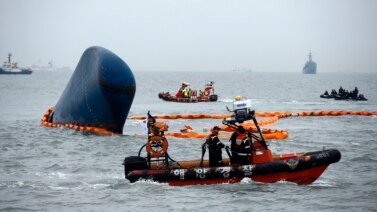This is IN THE NEWS in VOA Special English.
Kenya wants to organize a major international conference to discuss how to fight piracy off the coast of Somalia. The conference may also deal with ways to rescue Somalia from seventeen years of civil war. More than forty percent of its people depend on food aid.
Kenyan Foreign Minister Moses Wetangula says the world cannot end piracy without also dealing with Somalia's political problems. He says the piracy is partly born out of a "collective failure" to solve the problems of Somalia. He says the lawlessness there has created a breeding ground for the current threat.
Somali pirates operate in the Indian Ocean and the Gulf of Aden. The Gulf of Aden connects the Red Sea to the Mediterranean by way of the Suez Canal. The pirates have fast boats, modern weapons and equipment like satellite phones and global positioning systems.
The hijacking a week ago of an oil supertanker from off the coast of Kenya has brought new attention to the maritime criminals. Somali pirates have attacked more than one hundred twenty ships this year and hijacked almost forty of them.
The United Nations estimates that pirates have received about thirty million dollars in ransom money for hijacked ships. Kenya's foreign minister says his government believes pirate networks may have earned as much as one hundred fifty million. There are concerns that some of the money could go to Islamic terrorists in Somalia.
The tanker Sirius Star, at three hundred thirty meters long, is the biggest ship ever known to have been captured by pirates. It also happened farther south than most attacks, and farther out at sea -- more than eight hundred kilometers from land.
The ship was headed for the United States with two million barrels of oil, worth an estimated one hundred million dollars. A Saudi Arabian company owns the tanker. The pirates have reportedly demanded twenty-five million dollars in negotiations to release the ship and its crew of twenty-five.
Somali pirates generally do not steal goods or kill hostages. They are believed to be holding seventeen ships with about three hundred crew members. Among the ships is a Ukrainian vessel hijacked in September with a load of military weapons including tanks.
The increase in piracy is raising the cost of insuring ships. Also, oil from the Middle East and exports from East Asia could take longer to arrive.
Some of the world's heaviest shipping traffic passes the Somali coast. But major shipping companies have begun to consider new routes. One of the world's biggest shippers, A.P. Moller Maersk, says it will avoid the Gulf of Aden. A move away from the Suez Canal could hurt Egypt's economy.
American and other foreign navy ships are now watching for pirates. This week the Indian Navy destroyed a heavily armed "mother ship" in the Gulf of Aden. But the area to protect covers more than one hundred sixty million square kilometers.
And that's IN THE NEWS in VOA Special English, written by Brianna Blake. I'm Steve Ember.




